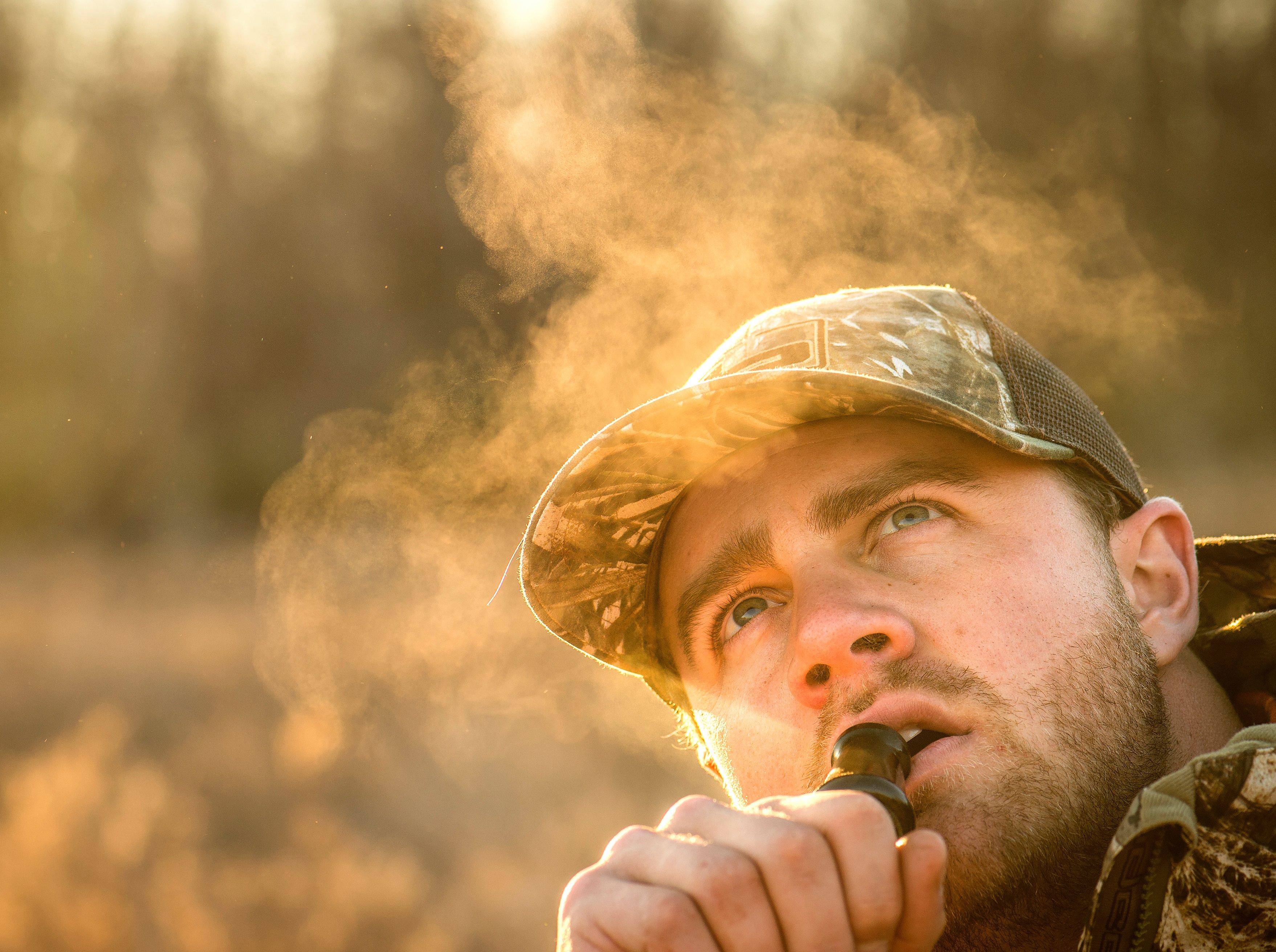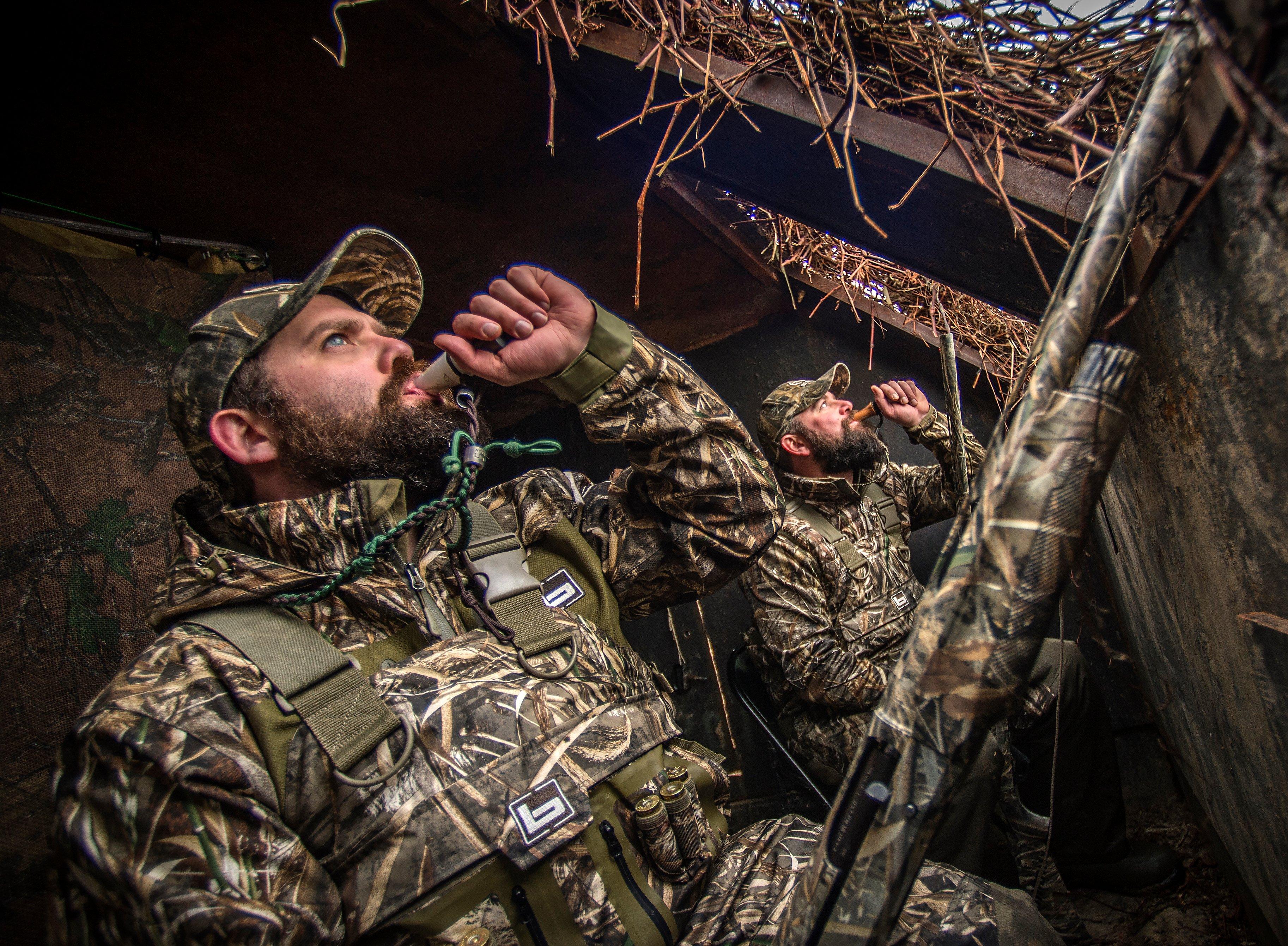Maybe duck calling contests don’t sound like your average day in the timber. That doesn’t mean the mechanics and practice required to compete can’t help you put more birds on the strap

Many aspects of competitive duck calling translate very well to actual duck hunting. Photo by Bill Konway
Many folks who watch their first duck calling contest might turn to a buddy and say something like, “Man, that’d never work where I hunt.”
And maybe that’s true. After all, when have you heard seemingly endless hail calls echoing through your local refuge? Even contest competitors admit there are stark differences between stage routines and calling in the timber. However, they’ll also tell you that the discipline, practice and attention to detail that made them high-level contest callers translates very well to duck hunting. In fact, most rank-and-file waterfowlers can improve their sound and success by taking a few tips from top contest pros.
DIFFERENCES AND SIMILARITIES
First, the obvious difference: Routines in the many incarnations of duck calling contests — including Main Street, Live Duck, Meat Duck and Cutdown — basically represent exaggerations of duck vocalizations and a condensation of real-world scenarios.
“In a contest, you have this perfect bunch of ducks that you call out of the heavens,” said 2006 World Championship Duck Calling Contest winner Jim Ronquest. “You almost get them till you lose them, and then you call them back and land them in a minute and 30 seconds. That doesn’t happen in real life. A contest is heavy on mechanics and heavy on picture-painting.”
But although competition callers are essentially trying to display their mastery of a duck call and impress judges, the roots of contests stem straight from hunting.
“There are a lot more similarities than people realize,” said Drake Waterfowl pro-staffer and 2009 World Championship Duck Calling Contest champion Mike Anderson, of Minnesota. “Regionally, you might not realize them. Do I go out here [Minnesota] and blow a 20-note hail call? No, I don’t. But I might be leaning against a tree in Bayou Meto, and it’s one of those days you might need to get on them, and you might use a 20-note hail call to get their attention.”
Ronquest pointed out that the elements for which competitors are judged in many contests — hail call, feeding call, comeback call, lonesome hen call, and overall presentation — apply directly to many hunting situations. Throughout a day of hunting or even working a flock, however, hunters use those elements more sparingly and as situations dictate.
“The mechanics that are rooted in sounding like a duck are the same mechanics that are rooted in competing in a contest,” he said. “Regardless of the contest, the whole point is to paint a picture. You need to quack like a duck and hit a duck lick in the middle. The hail call and comeback call have kind of grown to more than what a duck sounds like, but the mechanics are the same. It’s just how you apply the air. And there are places where blowing those Main Street-style hail calls kills ducks.”
Don’t Miss: Keep Your Gear Ready for Duck Season
HOW CONTESTS CAN HELP AFIELD
The No. 1 way contest calling applies to hunting is obvious: Competitors become very polished callers, which only boosts success.
“There are callers of ducks, and there are call operators, and there’s some of both,” Ronquest said. “I was fortunate to grow up around some really good duck callers who had really good mechanics, but becoming a serious competition caller improved my mechanics and thus made me a better call operator. Combined with learning to read ducks, that made me a better duck caller.”
Anderson agreed, saying the countless hours of practice and attention to detail give contest competitors an edge when hunting.
“In simplistic terms, the biggest correlation is just the ability to control the call at all ranges and all situations,” he said. “I can get as loud as I want, and I can get as soft as I want. And then I have the ability to have the air, so when it’s one of those days when those ducks want to hear a call, you have the wind to stay on them, and contest calling has helped with that tremendously.”
Contest competitors must build high-level calling mechanics, which is an umbrella term for the physical aspects of operating a call. And those skills are critical, whether in a contest or the marsh.
“It’s a combination,” Ronquest said. “It’s how you move your jaw, your tongue, and your throat, and how you apply the air, and from where you apply air. It’s how you enunciate, where you use your tongue and drop your jaw.”
Anderson said building up lung capacity and being able to control air are extremely important.
“A duck call is a woodwind instrument, and a contest caller is trying to play that woodwind instrument as acoustically pleasing as he can,” he said. “But it’s still a duck call. The more you can sound like a duck, the better you’ll do in contest and the better you’ll do in hunting.”
Constantly practicing good mechanics creates a long-term muscle memory, Ronquest said, which then lets a caller perform with little conscious effort — something that’s helpful when hunting, as you’re often focusing on reading ducks and calling shots.
“If you practice enough with a duck call, it becomes second nature so that you don’t think about what to do,” he said. “It’s like having a conversation. You don’t have to yell at the top of your lungs, but don’t whisper. It’s the same thing with blowing a duck call. You should know how you want to present that calling to them the first time. That’s the difference between calling at them and calling to them. The more practiced and confident you are, you don’t have to pick the call up and say, ‘I should perform a hail call at this time.’ You just know what you are supposed to do.”
The consistent repetition and critical feedback required for contest prep also build another important field calling consideration: confidence.
“As you develop your skill set and get stronger with it, it translates 100 percent to the field,” Anderson said. “From when you first start doing the basic quack and feed call to all of a sudden running 20-note hail calls, and your greeter and feed calls, there’s no situation when you can’t operate that duck call as needed.”
Also, accomplished contest callers can convey much greater feeling into their field routines — something that’s often overlooked.
“Within the painting of the picture, the guys who are the best at it believe where they’re at and put heart and emotion into it,” Anderson said. “Those are the guys who do really well.”

Duck calls are woodwind instruments. The more you can make them sound like a duck, the better you’ll do in contests and when hunting. Photo by Bill Konway
HOW IT CAN TRANSLATE FOR YOU
So obviously, incorporating the main principles of contest calling — practice, repetition and critique — can improve your calling and help you afield. But many hunters are unsure about the best way to start the process.
“Don’t practice routines,” Ronquest said. “We have noticed in all of the contest disciplines that a lot of younger guys are learning how to emulate people they listen to on YouTube or Facebook — emulating runs, if you will. Practice being a duck. Practice quacking. Go out and listen to a hen on the water quacking. Be those ducks. Listen to those individual notes. Listen to the uniqueness of those licks. If you just rely on practicing a routine, you’re not learning how to blow the duck call. You’re just learning a routine.”
Anderson said callers should also focus heavily on the basics before trying to move on to advanced duck talk.
“The basic foundations in duck calling are a quack and a cluck (a feed call),” he said. “Get that quack right. When you start doing different things on a duck call, it’s just variations of the quack. It’s the same with a feed call. Crawl before you walk. So many guys try to start out springing when they just need to learn the basics so the pyramid can grow as tall as it can.”
Hunters might wonder how much calling practice they need to become proficient. Anderson said the amount of time he spent practicing from about 1999 through 2004, when he was climbing the contest ranks, might qualify him for a straightjacket, and he said most successful contest callers go through a similar obsession for a period. Many hunters can’t replicate that dedication, but more practice is better than less.
“I blow a little bit during the year just to check myself,” Ronquest said. “The muscle memory from those early days comes back pretty quickly. A month or so before the season, get to blowing your duck call, and get yourself back in shape. It will pay dividends, I promise.”
Don’t Miss: 7 Shots You’ll Miss This Duck Season
CONCLUSION
Calling is just one aspect of duck hunting, and Ronquest said that when hunting mallards, being a skilled, confident caller probably adds a duck or two to the strap every day. But during the course of a season, those “extra” ducks add up, and being the best caller possible will never hurt you. Further, when you strive constantly to boost your sound, it lets you focus on duck hunting year-round, which is something every waterfowl nut can enjoy.










